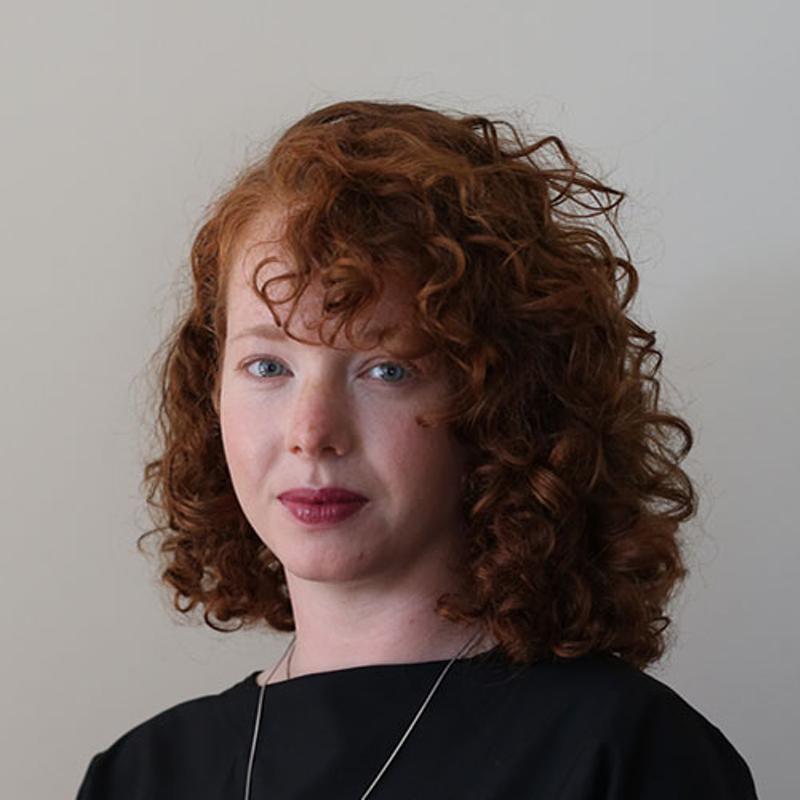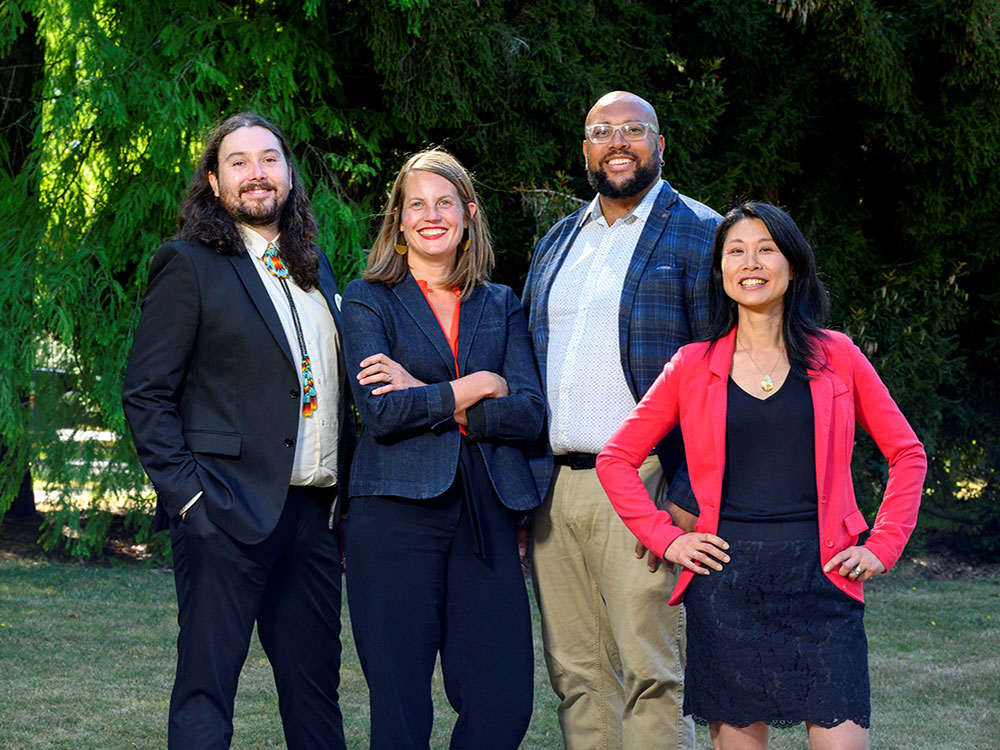[Editor’s note: The Tyee interviewed five mayoral candidates who are running in Vancouver. But power is held by council, not the mayor — so we’re also taking a look at three parties with incumbent city councillors who are running for re-election. We’ve also profiled COPE and the Greens. B.C. voters will cast ballots for municipal government on Oct. 15.]
Christine Boyle, a United Church minister, won her first Vancouver city council seat in 2018 under the banner of OneCity. It was a breakthrough for the relatively new party, created in 2014 as a centre-left alternative to COPE and Vision Vancouver. During Boyle’s tenure, she’s fought for ambitious, progressive policies that fit with her background of working on climate solutions and inequality.
In total, she tabled 18 motions, with land use the most common policy focus. She also focused on climate. Early in her term, she put forward a motion asking Vancouver to declare a climate emergency. It passed unanimously, setting the stage for Boyle’s Climate Emergency Action Plan, a plan that also passed.
During the past four years she’s been a dependable ally of Mayor Kennedy Stewart when it came to voting for council motions, specifically with regards to rental and non-market housing. For example, she was the only councillor to join him in abstaining from a vote for a motion that would slow down the construction of 75,000 new homes across Vancouver in the next 10 years.
“I am always willing to work with people who are going to come forward and support tangible solutions to the problems we face,” said Boyle.
But in a council divided between five parties and one Independent mayor, Boyle’s left-leaning policies didn’t always pan out. Especially not the more controversial ones. For example, her proposal to rethink zoning and remove public hearings for social housing was defeated eight to three.
This time OneCity is running four candidates for council, five for the school board and three for the park board.
“Having spent four years on this council, I can tell you very clearly that Vancouver would be well-served by more OneCity voices,” said Boyle. “I know if we get re-elected with stronger teams, we can do even more to make Vancouver a more welcoming and affordable place for all of us.”
Boyle says the party did not want to split the left vote by running a mayoral candidate. While they refuse to endorse any single candidate, both Boyle and Mayor Stewart have been dependable allies on council and are signalling that relationship would continue. Boyle refused to elaborate on why she didn’t join parties with Stewart, but said that in future elections, progressives need to be more unified.
“We need to figure out how we bring progressives together,” said Boyle. “We need to make sure we’re not splitting votes and fighting against each other, especially when so much is at stake for working people, families and the climate.”
OneCity’s progressive messaging took a beating last week when leaked chat logs showed that a party volunteer had suggested falsely smearing housing activist Rohana Rezel. He unsuccessfully ran for office in 2018 with ProVancouver, and is a critic of the idea that the region’s housing problems can be solved solely by adding more housing supply.
In response, OneCity released a statement saying that the discussed attack was “inappropriate” and “clearly inconsistent with our founding values.” They also said that the volunteer was no longer associated with the campaign.
But the divide among the self-styled progressive parties could produce a split vote anyway: Mark Marissen, a political strategist who decided to form his own party called Progress Vancouver and run for mayor, is offering a platform with policies cribbed from OneCity and COPE, as well as his own message that Vancouver needs to add denser housing to keep attracting families and growing the city’s economy.
Boyle says the mayoral race is not as important as the race for council. OneCity is hoping voters will deliver a municipal government stacked with like-minded progressives who can get stuff done.
The Tyee spoke to Boyle about these solutions and how they hope their platform will deal with the housing crisis and the toxic drug crisis, and foster public safety.
Housing
Building more homes faster and in every neighbourhood is the first stage of OneCity’s housing platform. This means constructing 6-storey buildings filled with multi-bedroom, family friendly units in every neighbourhood of the city, from busy roads to quiet, tree-lined neighbourhoods.
“We’ve almost entirely limited new rental housing to busy, noisy, polluted arterials and made very few changes within neighbourhoods,” said Boyle. “I think this is an unjust and inequitable way to plan a city.”
OneCity also wants to prioritize non-profit housing. To do this they will transform the Vancouver Affordable Housing Agency into a public developer that — given provincial approval — will have first right of refusal of all land that comes onto the market.
OneCity will also aim to make it easier and faster to build by eliminating hearings and empowering city staff to approve projects.
“Most local governments don’t have the length and extent of public hearings that Vancouver does,” said Boyle. “It is not a good and effective way to plan communities. We should be engaging residents in larger planning conversations and be talking earlier in the process.”
Renter rights is the second part of OneCity’s housing platform. They plan to turn the Renter Office — which currently provides information — into a Tenant Advocacy Office that will represent those facing renovictions, demovictions or evictions. The office will also maintain a registry of historic rental prices so tenants know when they’re being ripped off.
“Six floors and corner stores,” sums up the last leg of OneCity’s housing platform. It means approving grocery stores, cafes, restaurants and small-scale retail in all neighbourhoods, including historically wealthy neighbourhoods where the population is declining (Shaughnessy is one example).
“We have long passed the moment where basement suites are going to solve the scale of the housing crisis that we face,” said Boyle. “OneCity’s housing plan protects tenants, supports building a lot more of the types of housing that we need and it builds healthier, safer and more vibrant communities in every part of the city.”
Overdose
OneCity promises to expand access to overdose prevention sites, safe supply, medical-grade drugs, drug testing and naloxone kits.
“The poison drug supply is killing our neighbours,” said Boyle. “The first thing we need to do is make sure people stay alive.”
Her party would distribute nasal spray naloxone to all city employees who interact with the community, and make naloxone training and distribution a licensing condition for SROs.
The second step, according to Boyle, is about expanding the frontline response.
OneCity would increase access to detoxification centres and develop a non-prescription model of safer supply such as compassion clubs. They also plan to establish more overdose response teams and fund Vancouver Fire Rescue Services’ five-year growth plan.
They also want to include people who use drugs on city advisory committees. And the party is promising to equip parks with phone charging stations, essential to those living with homelessness and responding to an overdose.
OneCity will demand action that the provincial and federal government decriminalize higher quantities of drugs, said Boyle.
“There’s a huge advocacy role that local governments like Vancouver need to continue to play. It’s coming from local government, but informed by people who use drugs and frontline organizations. They know best about the solutions that will work.”
Public safety
OneCity plans to "de-task" the Vancouver Police Department through funnelling funds (currently one-fifth of the city’s annual budget) to create a Peer Assisted Care Team that will dispatch mental health professionals to people experiencing a crisis.
“It is really important that we respond with the right people and the right response to every situation,” said Boyle.
OneCity is promising to end police street checks, and request that police stop arresting or ticketing those engaged in sex work, drug use, camping or sidewalk vending.
They will also declare Vancouver a "Sanctuary City" for migrants and refugees, ensuring that those with precarious immigration status have safe access to city services and cannot be deported.
OneCity also hopes to promote public safety through fostering community.
“We need to shift gears and invest in the services that keep people out of crisis,” said Boyle. Her party wants to make courses on mental health available for free or low cost to the public and support Indigenous-led justice and community safety initiatives.
OneCity is also promising to streamline permitting for festivals, street vendors and performers while increasing street lighting, protected bike lanes and car-free or slow streets.
Boyle considers the 2021 heat dome an example of failed public safety because, she said, the 100 deaths were preventable. They died because the proper social and community support was not in place.
“Vancouverites experience high levels of loneliness and isolation,” said Boyle. “And we want to build neighbourhoods that actually combat this loneliness and social isolation by creating ways for people to get to know one another and look out for one another.” ![]()
Read more: Municipal Elections 2022, Municipal Politics

















Tyee Commenting Guidelines
Comments that violate guidelines risk being deleted, and violations may result in a temporary or permanent user ban. Maintain the spirit of good conversation to stay in the discussion.
*Please note The Tyee is not a forum for spreading misinformation about COVID-19, denying its existence or minimizing its risk to public health.
Do:
Do not: